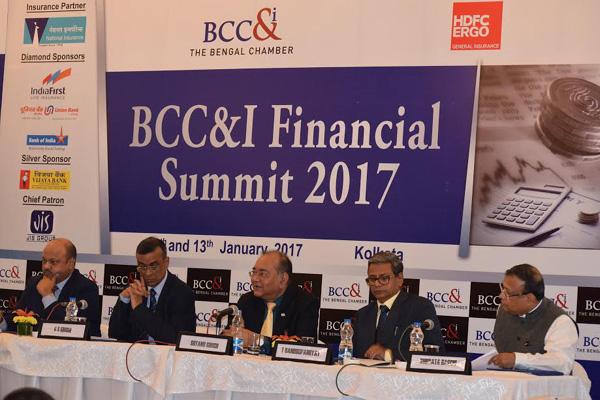 Image
Image
Technology has to support financial infrastructure say experts
Kolkata, Feb 7 (IBNS): Speakers at the Financial Summit 2017, recently organised by Kolkata-based Bengal Chamber of Commerce and Industries (BCC&I), emphasised on the need to integrate financial infrastructure and technology to boost capital markets.
Sutanu Ghosh, President, Bengal Chamber, said that the advancements in technology have brought the mobile and internet banking services to the fore. The private banking sector is laying greater emphasis on providing improved services to their clients and also upgrading their technology infrastructure, in order to enhance the customer’s overall experience as well as give banks a competitive edge.
Key speakers included N.K. Prasad (President and CEO, Computer Age Management Services Pvt. Ltd), Asim Ranjan Parashar (Executive Director- Management Consulting, PwC), Vibhor Tandon (AVP-BD, MCX India) and Saibal Biswas (BCCI Banking and Finance Committee).
“Financial infrastructure is essential in the capital market. It is technology that helps everyone to enjoy the same benefits. For example, someone in Shillong will have the same opportunities as someone from Mumbai," said N.K. Prasad.
.jpg) Technology is also a key part of the security system. It provides seamless access to the customer to his or her records, transactions and gives identical information at all points in time. Because of this, customers feel empowered, which increases their trust and confidence in the infrastructure, he added.
Technology is also a key part of the security system. It provides seamless access to the customer to his or her records, transactions and gives identical information at all points in time. Because of this, customers feel empowered, which increases their trust and confidence in the infrastructure, he added.
Said N.K. Prasad, “The telecom industry has made a lot of progress in their own set-up, from towers to mobile technology. If 100 crore people are using cellphones, compared to that we have over 5.2 crores accounts in the mutual funds department.”
“Indian households save a lot but only a small portion of it enters the mutual fund sector, thereby the securities market. The capital market plays a big role is funnelling these savings to investments. This is a huge opportunity for us,” added Prasad.
Asim Ranjan Parashar pointed out that most investors are guided by market sentiments.
“Often an investor finds it rather daunting to analyse the innumerable parameters and variables that drive the money market. Guided by market sentiments, they often end up with no or little gain," he said.
“If someone is here to invest for a short time at this point, it is not a good time with so much of volatility, especially during the election phases. But if someone wants to invest long term, at least for two to four years, it is a good idea, with quite a few sectors doing pretty well,” he added.
.jpg) Saibal Biswas said, “Some of the economic challenges that we face in the long term are Brexit, which is still in motion and we have to see how it goes. We are also waiting to see how US policies will affect the global market."
Saibal Biswas said, “Some of the economic challenges that we face in the long term are Brexit, which is still in motion and we have to see how it goes. We are also waiting to see how US policies will affect the global market."
"From the Indian perspective, we’ve seen some economic decisions being taken recently. Inflation is expected to taper down with the RBI keeping a close watch on it," he added.
"An interest-rate situation where lending might get cheaper is present too. Digitalisation is increasing and there might be some infrastructural difficulties now. But in the long term, it will lead India to be more transparent in," Biswas added.
Talking about investment planning, Biswas said, "The biggest demon for investment planning is going to be inflation. Chasing long term dreams with short term instruments are not a right strategy.”
(Reporting by Tanushree Sen)
Top Headlines
-
News
PM Modi expresses displeasure over NCERT judiciary chapter, wants accountability fixed
February 26, 2026
-
News
Former New Zealand PM Jacinda Ardern to relocate to Australia amid growing Kiwi exodus
February 26, 2026
-
News
Major aviation boost for Kashmir: Cabinet clears development of a new Civil Enclave at Srinagar International Airport
February 24, 2026
-
News
India urges all nationals to leave Iran 'by available means' as US-Iran tension grows
February 23, 2026
-
News
Ind.AI: Sovereignty, jobs, energy and the What If?
February 20, 2026
-
News
From car diplomacy to global strategy: Modi, Macron upgrade IndiaFrance ties
February 17, 2026
-
News
Seva Teerth: PM Modi inaugurates new PMO, announces these key decisions on first day
February 13, 2026
-
News
Hero of Operation Sindoor: IAF vice chief hails Rafale ahead of mega 114-jet deal
February 11, 2026
-
News
'Govt surrendered before Trump, sold Bharat Mata: Rahul Gandhi attacks Centre over IndiaUS trade deal
February 11, 2026
-
News
Painful times in my marriage: Melinda Gates reacts to Bill Gates being named in Epstein Files
February 05, 2026





